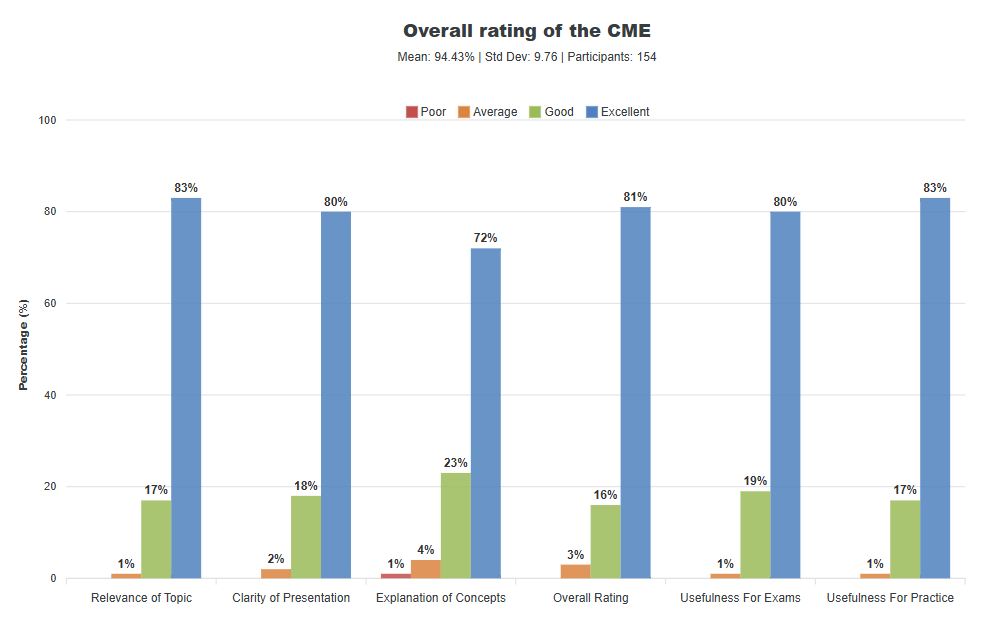PGCME – 2025
Comments & Verbatim from Participants
CME Feedback
1. Information presented at course will help me improve:
- Enhanced knowledge and skills in Hematology – clinical, academic, and practical.
- Better diagnostic skills, clinical approach, and patient management, including perioperative care.
- Useful for exam preparation and academic growth.
- Improved understanding of diagnosis and management of hematological disorders (anemia, leukemia, hematological malignancies, pediatric hematology-oncology).
- Exposure to evidence-based guidelines, recent advances, and laboratory aspects.
- Increased confidence, outlook, and interest in hematology as a career.
- Printed handouts and concise explanations were helpful.
- Presenters’ sessions were well appreciated.
2. The material presented will be incorporated in my practice in the following way:
- Clinical Practice & Patient Care
- Early diagnosis, appropriate investigations, counseling, and prognostication.
- Avoiding unnecessary investigations and ensuring relevant work-up.
- Incorporation of recent advances, molecular/genetic aspects, stem cell transplant, and apheresis.
- Improved management of hematology and hemato-oncology patients.
- Diagnostics & Laboratory
- Better interpretation of blood disorders, use of diagnostic algorithms, and precision treatment.
- Improved lab correlation with clinical findings.
- Academics & Exams
- Helpful for revision, quick reference, and exam preparation.
- Useful for teaching juniors and spreading knowledge to smaller centers.
- Supports clinical transition and fellowship preparation.
- Professional Development
- Enhances decision-making and confidence.
- Improves quality of practice and interest in hematology.
3. Recommendations for improvement of the program:
- Program Structure & Duration
-
- Sessions felt tightly packed – fewer sessions per day or extend to 4 days.
- End by 5 pm (not 7 pm).
- More breaks and longer intervals.
- More interactive sessions, quizzes, case-based discussions.
- More focus on basics for first-year residents; simpler pace for some sessions.
- Include flow cytometry interpretation, molecular techniques, hands-on/lab tours.
- In-house accommodation.
- Chairs with writing pads, larger auditorium, more display screens.
- Well organized, excellent program, no need for changes.
4. Suggested topics for future CME:
- Core Hematology:
- Myeloma, MDS.
- Pediatric hematology and PHO topics.
- Hematological malignancy management.
- Diagnostics:
- Flow cytometry basics, bone marrow aspiration/biopsy interpretation.
- CBC interpretation, smear reading, histograms.
- Coagulation disorders and workshops.
- Molecular diagnostics, cytogenetics, FISH, NGS, CAR-T therapy, cellular therapies.
- Applied/Clinical Areas:
- Transfusion medicine (blood products, HLA, apheresis).
- Stem cell transplantation, complications, long-term follow-up.
- Infectious diseases in hematology.
- Pharmacology of anticoagulants, oncological emergencies.
- Exam-oriented case discussions and practical approaches.
5. Additional comments:
- Majority: Excellent CME, very useful, well organized.
- Faculty (Dr. Vikram Mathews, Dr. Biju, Dr. Sukesh) appreciated for inspiring teaching.
- Many requested more frequent CMEs and dedicated CME for transfusion medicine.
- Some suggested separate CME for first-year residents.
- A lab visit (HLA, molecular) would add value.
- Program has kindled interest in pursuing hematology as a career.

